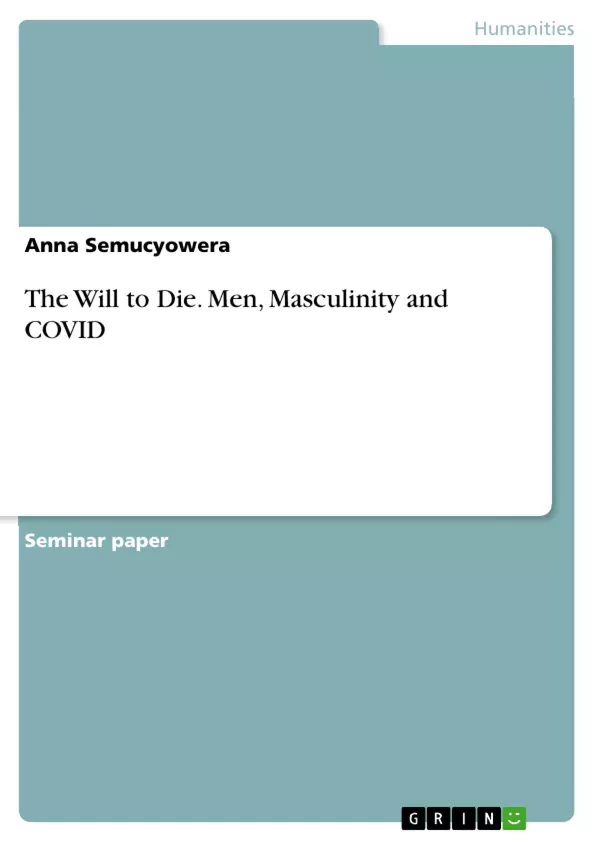The global impact of the COVID-19 pandemic has unveiled striking disparities in infection and mortality rates, with one notable trend being the higher susceptibility of men to severe outcomes. As men account for a disproportionate number of COVID-19-related deaths in the United States, understanding the underlying factors contributing to this gender-based disparity becomes imperative. While initial investigations predominantly focused on biological differences between the sexes, emerging evidence suggests that societal constructs of masculinity play a pivotal role in shaping men's responses to health recommendations and, consequently, their vulnerability to COVID-19.
This paper delves into the intricate relationship between masculinity and the elevated rates of COVID-19 infections and deaths among men. By drawing on insights from psychological studies, the analysis goes beyond the confines of biological explanations, highlighting how traditional male behaviors, such as risk-taking, independence, and resistance to authority, may contribute to men's lower adherence to health recommendations.
The title, "The Will to Die: Men, Masculinity & COVID-19," encapsulates the essence of this exploration, hinting at the complex interplay between traditional masculinity norms and the heightened susceptibility of men to the severe consequences of the pandemic. From risk-taking behaviors to a distrust of scientific expertise and lower levels of Agreeableness, each aspect will be dissected to provide a comprehensive understanding of why men, adhering to traditional masculine norms, may be more resistant to following crucial COVID-19 health guidelines.
This research aims not only to unravel the specific behavioral patterns linked to masculinity but also to shed light on the broader societal implications of how deeply ingrained norms of masculinity can impact public health outcomes during a global crisis.
Inhaltsverzeichnis (Table of Contents)
- The Will to Die: Men, Masculinity & COVID-19
- Risk-taking Behaviour
- Belief in Science
- Agreeableness
Zielsetzung und Themenschwerpunkte (Objectives and Key Themes)
This paper aims to explore the role of masculinity in the higher rates of COVID-19 infection and mortality among men. It challenges the notion that biological factors alone can explain these disparities and argues that traditional masculine behaviors contribute to men's lower adherence to COVID-19 health recommendations.
- The influence of traditional masculinity on men's health behaviors
- The role of risk-taking in men's responses to the COVID-19 pandemic
- The impact of masculinity on trust in scientific experts and government recommendations
- The relationship between masculinity and agreeableness in shaping men's attitudes towards COVID-19 precautions
Zusammenfassung der Kapitel (Chapter Summaries)
- The Will to Die: Men, Masculinity & COVID-19: This section introduces the research question and highlights the significantly higher mortality rate of COVID-19 among men compared to women. It argues that biological factors alone cannot fully explain these differences and emphasizes the need to examine gender-specific behaviors, particularly those linked to traditional masculinity.
- Risk-taking Behaviour: This section examines the association between traditional masculine norms and risk-taking behaviors, particularly in the context of health. It explores evolutionary explanations for men's higher risk-taking propensity and cites studies showing that adherence to masculine norms is linked to engagement in risky behaviors that can negatively impact health. The section then connects this risk-taking tendency to men's reduced adherence to COVID-19 health recommendations, such as social distancing and mask-wearing.
- Belief in Science: This section investigates the relationship between traditional masculinity and trust in scientific experts. It argues that men who conform to these norms may be less likely to accept recommendations from experts as a way of demonstrating independence. The section explores the role of Donald Trump's rhetoric in shaping the distrust of scientific recommendations among certain groups, particularly working-class men.
Schlüsselwörter (Keywords)
This paper focuses on the intersection of COVID-19, masculinity, agreeableness, trust, and men's health. It examines the ways in which traditional masculine norms, including risk-taking, independence, and low agreeableness, contribute to men's lower adherence to COVID-19 health recommendations and ultimately, their higher mortality rates.
- Quote paper
- Anna Semucyowera (Author), 2023, The Will to Die. Men, Masculinity and COVID, Munich, GRIN Verlag, https://www.hausarbeiten.de/document/1437586


